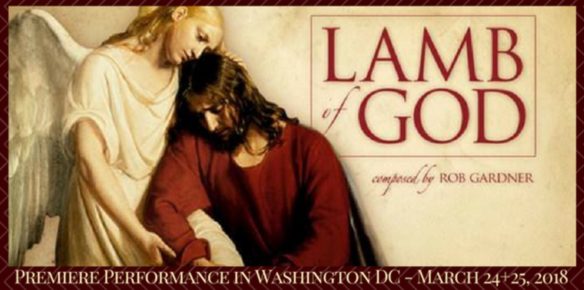
For months now I’ve been rehearsing for this weekend’s DC premiere performance of Lamb of God, Rob Gardner’s luminous work on the events surrounding the death and resurrection of Jesus Christ. I’ve seen the choir stumble over the Aramaic words, carefully taught pronunciation syllable by syllable. I’ve suffered through the first rehearsal with full orchestra where the subtle timings of the music were routinely missed. And then came our opening performance yesterday, where the power of Christ’s pleading in Gethsemane and Peter’s anguish after denying the Christ caused many to weep.
It happens that the venue where we are performing is no small distance from our home. And so my husband, whose voice is amazing, has been pleased to read to me from The Christ Who Heals, a recent book by Terryl and Fiona Givens which my husband purchased last Saturday.
If you are a Mormon who wishes to understand your faith tradition, you must read The Christ Who Heals. That’s all there is to it.
I’ve grown up Mormon. I’ve always known of Christ as the premortal champion of our free will, the one who promised to make up the lack we as mortals would incur during life, so that we could return to God’s glory. I’ve always known of God as a loving Father of my immortal spirit, yearning for me to choose to return, knowing that I might refuse Him. I have known that God had a way for all mankind to return, even those of us who had been born at times when the power of the saving ordinances was not available to us in the flesh.
Growing up with this, I have not understood the bleakness of traditional Christianity.
I never understood before why the conspirators agitating for the death of Joseph Smith Jr. would proclaim the truth of the restored gospel, stating that:
“the pure principles set forth in [the Old and New Testaments, Book of Covenants, and Book of Mormon] are the immutable and eternal principles of Heaven, and speaks a language which, when spoken in truth and virtue, sinks deep into the heart of every honest man. — [The gospel’s] precepts are invigorating, and in every sense of the word, tend to dignify and ennoble man’s conceptions of God and his attributes. It speaks a language which is heard amidst the roar of Artillery, as well as in the silence of midnight: it speaks a language understood by the incarcerated spirit, as well as he who is unfettered and free…”
Terryl and Fiona Givens take us through a journey of discovering how much credal Christianity had abandoned the truths of what the Givenses refer to as cradle Christianity, the earliest beliefs of the Christian fathers who knew Christ and His apostles.
The Givenses, with words reminiscent of a resurrected Neal A. Maxwell, give us the wisdom of Irenaeus, who was far enough from Christ’s time that he explained clearly, yet close enough to Christ’s time that his writings credibly reflect what Christ and His disciples taught. To Mormons, Irenaeus sounds very reasonable.
But then Greek philosophy and Augustine happened. Christianity jettisoned the idea of a God who knew us as His children and made God an entity without passion. In glorifying God, these later Church fathers proclaimed man mere creation, without will. This omnipotent God was the author of all human experience, therefore the creator of all good and all evil. Mankind became pieces in a play for the pleasure of God, without any responsibility for their actions.
In the gospel as distorted by later Church fathers, the fall of Eve (it was all the fault of a woman) created a milieu where mankind was inherently evil. We were like a piece of fine crystal that had fallen and become broken.
But cradle Christianity had seen the fall as a necessary step on the path of our growth towards God, as that first rehearsal with the orchestra was a necessary step on the path to a powerful first performance. As seen through the eyes of cradle Christianity and the restoration, sin is merely something that happens, not our entire essence.
Through the eyes of the Givenses, we see God and Christ yearning to make us whole, yearning to help us become our best selves, actively striving for our welfare, where traditional Christianity is pleased to see us as creatures whose sole purpose is the pleasure of a God who doesn’t care.
If the week before Easter is a time where you have leisure to read about the great goodness of your Savior, I urge you to read The Christ Who Heals.
_____________
The Christ Who Heals is available at Deseret Book, Amazon, and the bookshelves of many of your Mormon friends. Call them and see if they can bring it to Church for you to borrow.